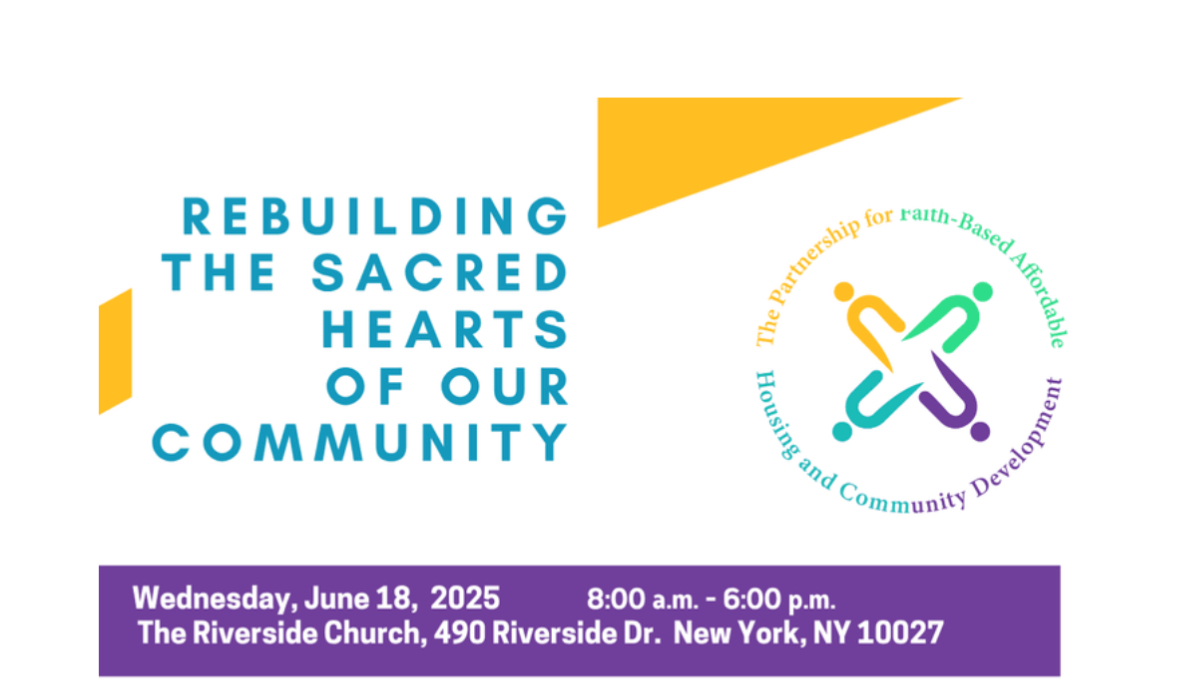Faith-Based Institutions and the Future of Affordable Housing

By Denise Scott, Bell and Notice Advisors
Earlier this week, I had the honor of delivering the keynote address at a powerful housing conference hosted by the New York State Council of Churches, titled “Rebuilding the Sacred Hearts of Our Community.”
Led by Reverend Peter Cook, the Council plays a critical role in supporting faith-based organizations across New York State. Through consulting and technical assistance, they help congregations explore how their land can be used to create affordable housing and community-serving programs that meet urgent local needs.
Learn more about NYSCOC’s Affordable Housing & Community Development Initiatives here—a resource guiding congregations in using their property for community impact.
At the request of several attendees, I’m sharing my written talking points below. I hope they serve as both inspiration and guidance for those considering the sacred work of faith‑based housing development.
“Good morning. Let me start by thanking the New York State Council of Churches for the important work you do to support the development of faith based land. Peter your leadership is much appreciated. Thank you for inviting me to speak here today.
Affordable housing has been the focus of over four decades of my work. I wish I could say that in over four decades we would have solved the affordable housing problem- but instead today- housing is at a crisis state.
Over the years there just hasn’t been a significant enough investment in affordable housing; and the cost to build and maintain affordable housing has risen exponentially. While the City of NY has done a tremendous job in investing city resources in the development and preservation of affordable housing, along with the State of NY, the Federal government has largely been absent for decades.
And so today housing needs have reached crisis levels.
Some may even describe The Need for Affordable Housing as a Spiritual & Social Justice Issue- Since affordable housing is a lifeline. It’s a determinant of health- physically, emotionally and mentally.
-
- One in four renters pays over half their income in rent. There’s no city in the country where a minimum wage working family of four can afford a 2 bedroom apartment. Homeownership is largely out of reach for most. And there’s a growing number of families at risk of homelessness.
- One in four renters pays over half their income in rent. There’s no city in the country where a minimum wage working family of four can afford a 2 bedroom apartment. Homeownership is largely out of reach for most. And there’s a growing number of families at risk of homelessness.
-
- Housing insecurity now affects families at various income levels, including seniors, and most probably many of your own congregants.
-
- This is a solvable problem — if we mobilize political will and the significant resources necessary. Mobilize to both preserve the housing that is currently affordable ( the subject of a conversation for another day) and for today’s focus- build more affordable housing. This is where the faith community comes in.
Faith-based groups have historically led social change.
- This is a solvable problem — if we mobilize political will and the significant resources necessary. Mobilize to both preserve the housing that is currently affordable ( the subject of a conversation for another day) and for today’s focus- build more affordable housing. This is where the faith community comes in.
-
- Throughout the civil rights movement through today it has been the church that played a significant role in organizing and advocacy while also filling gaps in human services.
-
- Affordable housing is a natural extension of that leadership.
So for the faith based community with land consider That Housing could be Grounded in your Mission
-
- Imagine Affordable housing as a modern ministry.
Providing safe, stable homes is one of the most direct ways to live out faith in action and serve the community.
- Imagine Affordable housing as a modern ministry.
-
- You already have one of the most powerful assets: land.
-
- Churches and religious institutions are among the largest landowners in the United States — and much of that land is underused.
-
- This is a call to stewardship, not just real estate.
-
- Housing can be a faithful, values-aligned use of land that multiplies impact for generations.
The Important Reminders About Your Land and Role:
-
- Your First Steps are key to success. It’s about connecting Faith and Wisdom to a complex development process
-
- Ask: Does this align with our mission and values?
- Ask: Does this align with our mission and values?
-
- Inventory your land and buildings. What do you actually have to work with?
-
- Talk to others who’ve done it. Learn from sister churches or temples.
-
- Begin small. A feasibility study, a listening session, a congregational vote — are all powerful first steps.
-
- Your land is valuable — treat it like a major asset.
It’s often your strongest contribution to the project. And yet, there are limits. Affordable housing can’t cover the cost of other programs. You’ll need to find other resources for all your other program goals.
- Your land is valuable — treat it like a major asset.
-
- Know the market value and development potential of your land.
Get a zoning analysis and appraisal or feasibility study early.
- Know the market value and development potential of your land.
-
- Use your land to negotiate for mission alignment and long-term benefit.
Consider ground leases or joint ventures that keep you involved throughout the life of the project.
- Use your land to negotiate for mission alignment and long-term benefit.
-
- Maximize your stake — but be realistic.
The land matters, but there are many other development costs. As I just stated, Other program considerations will need a different source of funding.
- Maximize your stake — but be realistic.
-
- Understand your limits.
Pushing too hard for control without experience or unrealistic funding requests can delay or derail the project.
- Understand your limits.
-
- Focus on balanced partnerships.
Look for co-developers who values your mission and who will offer transparency, and inclusiveness not just capital.
- Focus on balanced partnerships.
Keeping a faith-based affordable housing project viable, fundable, and compliant during the predevelopment, construction and operational stages requires both strategic clarity and practical discipline.
Think like a faith based steward and act like a developer.
Faith and practicality are not in conflict. Your values are the Anchor …. but systems, strong viable partnerships, a solid development plan and budget and understanding the required detailed paperwork are the Sail.
Consider the range of What’s Possible
-
- Models vary and can be very complex— you can’t do this to do this alone.
Consider various options- lease your land, partner with a nonprofit developer, or co-develop with a mission-aligned team.
- Models vary and can be very complex— you can’t do this to do this alone.
-
- Mission-forward designs are possible.
Include community rooms, worship space, gardens, or workforce housing — it doesn’t have to look like a conventional apartment building. Mix- use and mix-income options are possible. For example, housing with commercial space ( If the zoning permits, commercial uses can generate a continuous flow of income.) But remember the affordable housing won’t cover the cost of other non- housing uses- you will need to raise other funds to add uses such as daycare, schools, or community programs. Layering funding sources is very complex/very complicated and takes a very long time.) But it has been done.
- Mission-forward designs are possible.
-
- There is available funding for the affordable housing work itself.
City, County, State, bank, a small amount of federal dollars, tax credits, and foundation grants are available — but strong partnerships and thorough preparation are key.
- There is available funding for the affordable housing work itself.
So essentially what I’m saying is I believe the faith base development of affordable housing can be aligned with the church’s mission. Yet to be very clear like most missions it’s not for the faint of heart. Clarity of purpose- of mission is required throughout the process. There may be internal resistance within the church.
Educating your board and congregation about the vision and values behind this work is essential and a good place to start.
It is key that there is Complete and Unwavering alignment within the church at all levels -from the Pastor to the Pews!
There’s no room for confusion. And also, Work it out with the church hierarchy (the Bishops and various Boards.)
There must be unity in purpose, vision and actions! Everyone must be on the same page.
Today’s Market Realities makes development of housing more of a challenge: So you must be Informed and Prepared
-
- The market is tight and more competitive than ever.
Funders, lenders, and tax credit agencies are applying stricter guidelines to select only the most viable, well-prepared projects.
- The market is tight and more competitive than ever.
-
- Affordable housing dollars are limited — and the field is crowded.
Strong partnerships, readiness, and mission clarity give you an edge.
- Affordable housing dollars are limited — and the field is crowded.
-
- Expect more due diligence from funders.
Clear documentation, realistic budgets, and experienced teams help your application stand out.
- Expect more due diligence from funders.
-
- Rising costs affect everything.
Labor shortages, material delays, tariffs, and supply chain issues are driving up construction costs and timelines.
- Rising costs affect everything.
-
- Insurance costs are surging in many areas.
Especially in climate-exposed zones, insurance can make or break a project budget — plan for it early.
- Insurance costs are surging in many areas.
-
- Plan for flexibility and contingencies.
Cost overruns and delays are common — build margins into your plan, not just your finances.
- Plan for flexibility and contingencies.
There are other Challenges to Prepare For
-
- It takes time, strong relationships, and paperwork.
Development of projects often take 2–5 years or more. This is a marathon, not a sprint.
- It takes time, strong relationships, and paperwork.
-
- You’ll need trusted advisors.
From legal support to development consultants, assembling a solid team upfront saves time and stress later.
- You’ll need trusted advisors.
In Closing, the most successful process for affordable housing development is having a keen Vision, the necessary funding and solid alignment of the key players.
-
- You don’t have to be an expert to start — you just have to be open to fully learn the process.
There’s support, guidance, and while not unlimited- there’s funding and a growing community walking this path together.
- You don’t have to be an expert to start — you just have to be open to fully learn the process.
-
- This isn’t just about a building. It’s a blessing.
You can provide dignity, stability, and sanctuary — every day of the week to families sorely in need of the security of descent and affordable housing.
- This isn’t just about a building. It’s a blessing.
To the affordable housing community and to many families throughout the state and across this country, your land is like manna”
Thank you for listening!
————-
A Final Note: The Importance of Local Community Support
One important question raised during the event was about the role of local community approval. This cannot be overstated. Even with land, funding, and a strong development team, projects can stall or fail without genuine community engagement and support. Local residents, community boards, and neighborhood stakeholders often have valid concerns—and sometimes fears—about changes to their neighborhood. That’s why it’s essential to build trust early and often. Hold listening sessions, share transparent updates, and make space for community voices in the design and planning process. Faith-based institutions, in particular, have a unique opportunity to lead with moral credibility and relational capital—but it must be exercised with humility and a willingness to listen. When the community feels seen, heard, and respected, projects are not only more likely to succeed—they’re more likely to thrive.#
__
Denise Scott, Founder of Bell and Notice Advisors, is a nationally recognized leader in community development finance. Over the course of her nearly 40 year career she oversaw the implementation of billions of dollars of investments in cities and rural communities nationwide.



